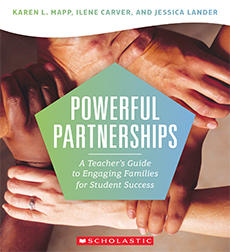True Partnerships Grow from Family Engagement
Powerful Partnerships: A Teacher’s Guide to Engaging Families for Student Success
By Karen L. Mapp, Ilene Carver and Jessica Lander
(Scholastic, 2017 – Learn more)

Powerful Partnerships is a practical and research-based book. Both new and experienced teachers will find helpful ideas for strengthening their family engagement practices in meaningful ways that support students’ academic and social success.

The authors further delve into beliefs about family engagement in the first chapter. They encourage readers to examine their own beliefs about the role that families play in their children’s learning. They also describe the core principles that form the foundation for their ideas and work with families. They are:
- All families have dreams for their children and want the best for them.
- All families have the capacity to support their children’s learning.
- Families and school staff are equal partners.
- The responsibility for cultivating and sustaining partnerships among school, home, and community rests primarily with school staff, especially school leaders.
Family engagement in four categories of schools
Chapter two of the book provides a framework for further reflecting on family engagement practices. Using the description of four different categories of schools that vary in their level of family engagement, readers can identify strengths in their connections with families and areas for improvement.
Within the description of each category of school, the authors have given specific examples of what you’d see and hear in such a school. This helps readers understand the varying levels of family engagement and reflect on their own situation. The authors also describe conditions that are essential to effective family partnerships that will build teachers’ understanding of how to plan for engagement.
Implementing strategies for engagement
For teachers looking for practical ideas that they can implement immediately to strengthen their relationships with families, chapters three through five will be very useful. Each of these chapters provides steps that teachers can take to promote family engagement.
In chapter three, the authors focus on strategies that can be implemented before the school year begins and at the beginning of the year, such as phone calls to welcome families and home visits. In addition, they provide advice for making back-to-school nights more interactive for families.
The focus of chapter four is the family conference and IEP meetings. The authors explain how family conferences can help to extend relationships with families and include students’ voices. There are also ideas to ensure that IEP meetings are a collaborative process. The idea of IEP one-pagers is one that I find useful even as an experienced educator.
Chapter five provides further support for teachers, with ideas for maintaining positive relationships throughout the year. Although the focus is mainly on four strategies, other ideas are included. These ideas are intended to honor families, increase communication, and promote interaction among parents. The ideas presented in the book can be implemented across grade levels. In addition, there are suggestions for partnering with families of students who are learning English.
Practical talk and plentiful resources
The authors end the book with a chapter that includes additional resources. Teachers can find tools, such as sample letters that help families understand what they can do to support their children’s learning, and a script to use when making phone calls to families. An extensive list of references includes websites and titles of books and articles if readers are looking for even more information related to family engagement.
Powerful Partnerships is both practical and conversational. The voices of parents and educators are included throughout the book as their stories related to family engagement are shared. The author’s own experiences partnering with families and their thoughts about these experiences are also highlighted. Powerful Partnerships will inspire educators to consider their family engagement practices and build partnerships that are collaborative, interactive, and learning focused. This book will also serve as a go-to resource for those who are looking for ideas to improve upon their efforts to engage families.
Dr. Lisa Maucione is a literacy specialist in Dartmouth, Massachusetts. She has presented professional development workshops related to literacy, both in her district and at professional conferences. Lisa is the chair of the Publicity Committee of the Massachusetts Reading Association. Her blog is Literacy On The Mind and her Twitter handle is @DrLMaucione.































Lisa, this book does sound practical. I especially like the idea of sample scripts and letters to send home and sheets for aiding the IEP process. It sounds like this book could save a teacher or administrator a lot of time! Thanks for reviewing.